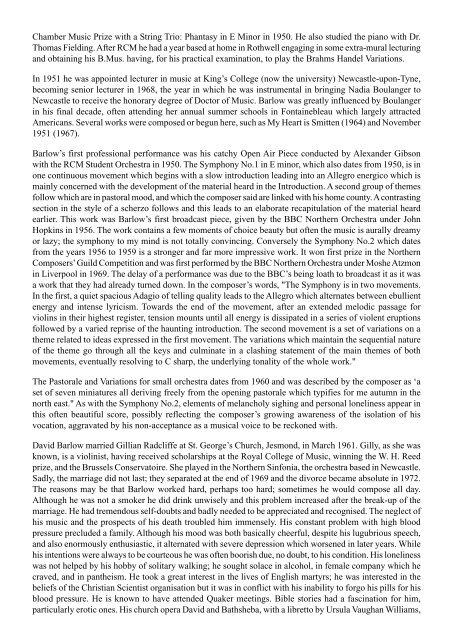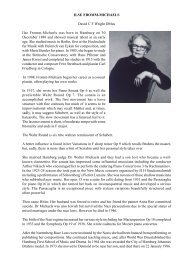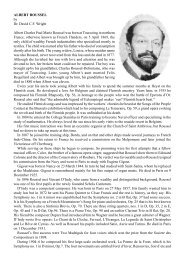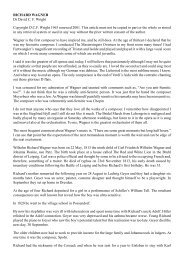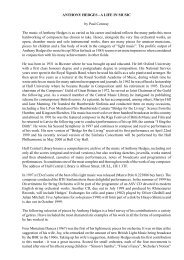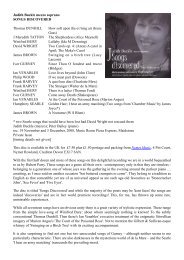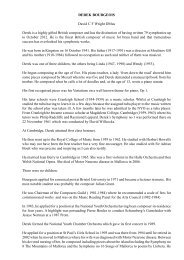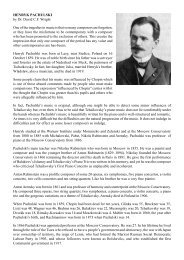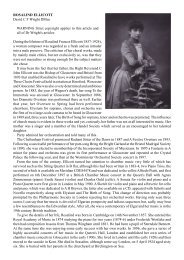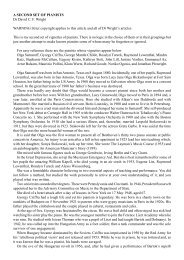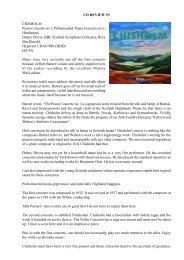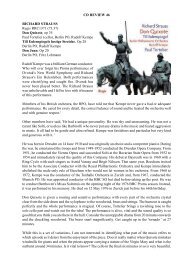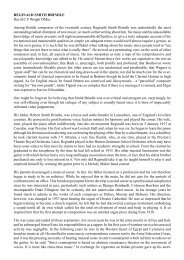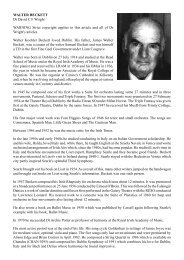David Barlow - Dr David Wright
David Barlow - Dr David Wright
David Barlow - Dr David Wright
Create successful ePaper yourself
Turn your PDF publications into a flip-book with our unique Google optimized e-Paper software.
Chamber Music Prize with a String Trio: Phantasy in E Minor in 1950. He also studied the piano with <strong>Dr</strong>.<br />
Thomas Fielding. After RCM he had a year based at home in Rothwell engaging in some extra-mural lecturing<br />
and obtaining his B.Mus. having, for his practical examination, to play the Brahms Handel Variations.<br />
In 1951 he was appointed lecturer in music at King’s College (now the university) Newcastle-upon-Tyne,<br />
becoming senior lecturer in 1968, the year in which he was instrumental in bringing Nadia Boulanger to<br />
Newcastle to receive the honorary degree of Doctor of Music. <strong>Barlow</strong> was greatly influenced by Boulanger<br />
in his final decade, often attending her annual summer schools in Fontainebleau which largely attracted<br />
Americans. Several works were composed or begun here, such as My Heart is Smitten (1964) and November<br />
1951 (1967).<br />
<strong>Barlow</strong>’s first professional performance was his catchy Open Air Piece conducted by Alexander Gibson<br />
with the RCM Student Orchestra in 1950. The Symphony No.1 in E minor, which also dates from 1950, is in<br />
one continuous movement which begins with a slow introduction leading into an Allegro energico which is<br />
mainly concerned with the development of the material heard in the Introduction. A second group of themes<br />
follow which are in pastoral mood, and which the composer said are linked with his home county. A contrasting<br />
section in the style of a scherzo follows and this leads to an elaborate recapitulation of the material heard<br />
earlier. This work was <strong>Barlow</strong>’s first broadcast piece, given by the BBC Northern Orchestra under John<br />
Hopkins in 1956. The work contains a few moments of choice beauty but often the music is aurally dreamy<br />
or lazy; the symphony to my mind is not totally convincing. Conversely the Symphony No.2 which dates<br />
from the years 1956 to 1959 is a stronger and far more impressive work. It won first prize in the Northern<br />
Composers’ Guild Competition and was first performed by the BBC Northern Orchestra under Moshe Atzmon<br />
in Liverpool in 1969. The delay of a performance was due to the BBC’s being loath to broadcast it as it was<br />
a work that they had already turned down. In the composer’s words, "The Symphony is in two movements.<br />
In the first, a quiet spacious Adagio of telling quality leads to the Allegro which alternates between ebullient<br />
energy and intense lyricism. Towards the end of the movement, after an extended melodic passage for<br />
violins in their highest register, tension mounts until all energy is dissipated in a series of violent eruptions<br />
followed by a varied reprise of the haunting introduction. The second movement is a set of variations on a<br />
theme related to ideas expressed in the first movement. The variations which maintain the sequential nature<br />
of the theme go through all the keys and culminate in a clashing statement of the main themes of both<br />
movements, eventually resolving to C sharp, the underlying tonality of the whole work."<br />
The Pastorale and Variations for small orchestra dates from 1960 and was described by the composer as ‘a<br />
set of seven miniatures all deriving freely from the opening pastorale which typifies for me autumn in the<br />
north east." As with the Symphony No.2, elements of melancholy sighing and personal loneliness appear in<br />
this often beautiful score, possibly reflecting the composer’s growing awareness of the isolation of his<br />
vocation, aggravated by his non-acceptance as a musical voice to be reckoned with.<br />
<strong>David</strong> <strong>Barlow</strong> married Gillian Radcliffe at St. George’s Church, Jesmond, in March 1961. Gilly, as she was<br />
known, is a violinist, having received scholarships at the Royal College of Music, winning the W. H. Reed<br />
prize, and the Brussels Conservatoire. She played in the Northern Sinfonia, the orchestra based in Newcastle.<br />
Sadly, the marriage did not last; they separated at the end of 1969 and the divorce became absolute in 1972.<br />
The reasons may be that <strong>Barlow</strong> worked hard, perhaps too hard; sometimes he would compose all day.<br />
Although he was not a smoker he did drink unwisely and this problem increased after the break-up of the<br />
marriage. He had tremendous self-doubts and badly needed to be appreciated and recognised. The neglect of<br />
his music and the prospects of his death troubled him immensely. His constant problem with high blood<br />
pressure precluded a family. Although his mood was both basically cheerful, despite his lugubrious speech,<br />
and also enormously enthusiastic, it alternated with severe depression which worsened in later years. While<br />
his intentions were always to be courteous he was often boorish due, no doubt, to his condition. His loneliness<br />
was not helped by his hobby of solitary walking; he sought solace in alcohol, in female company which he<br />
craved, and in pantheism. He took a great interest in the lives of English martyrs; he was interested in the<br />
beliefs of the Christian Scientist organisation but it was in conflict with his inability to forgo his pills for his<br />
blood pressure. He is known to have attended Quaker meetings. Bible stories had a fascination for him,<br />
particularly erotic ones. His church opera <strong>David</strong> and Bathsheba, with a libretto by Ursula Vaughan Williams,


